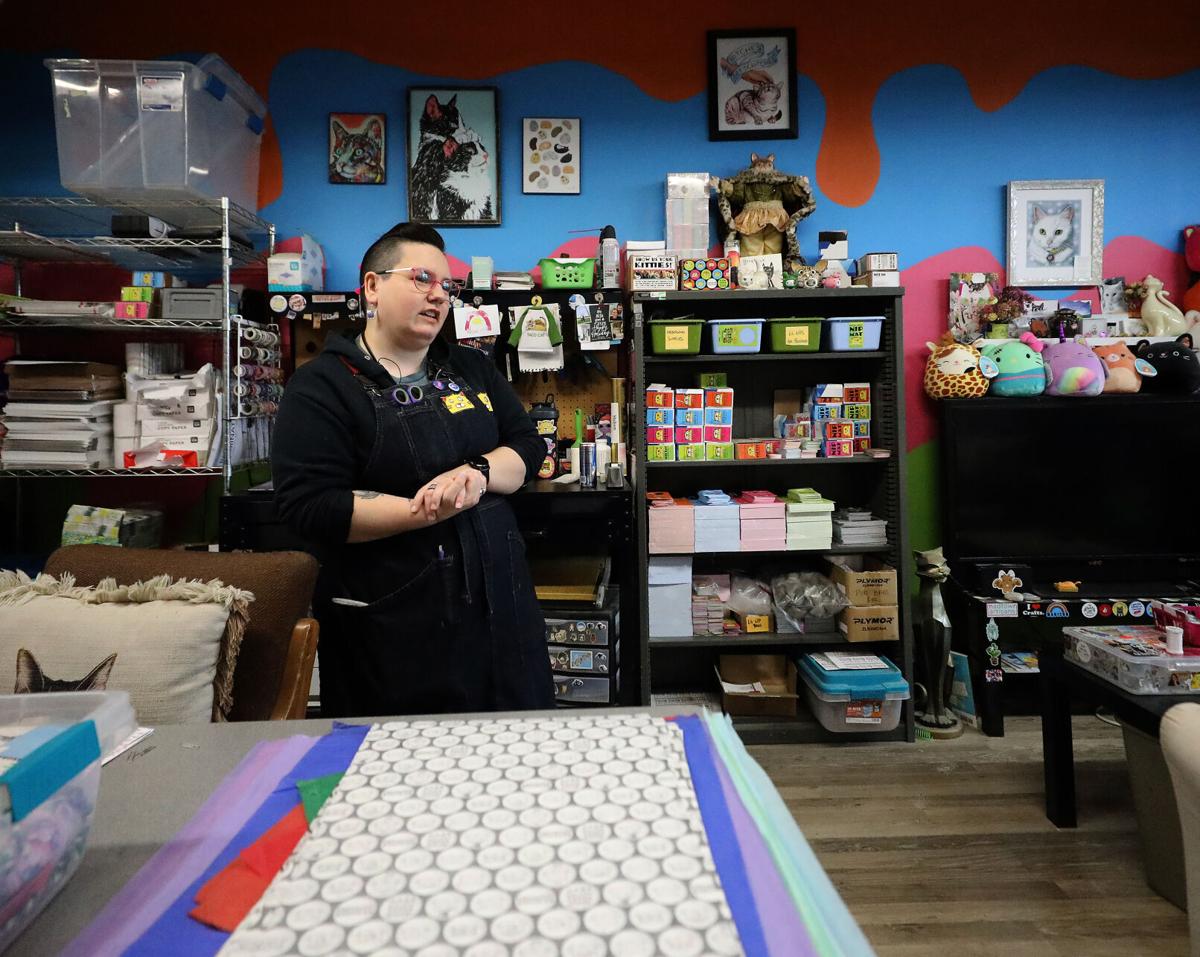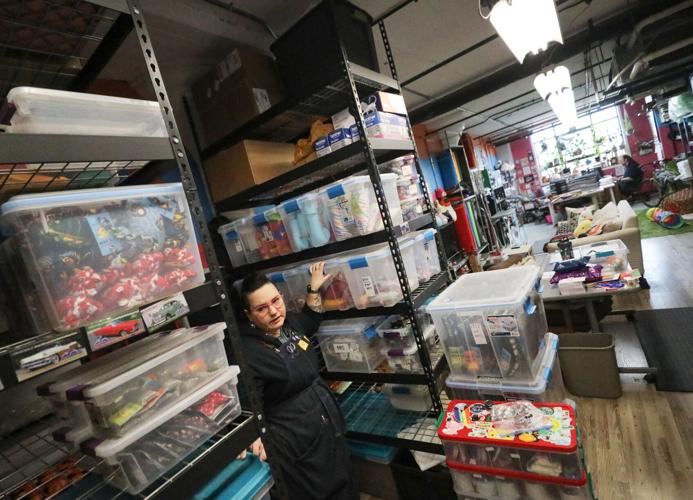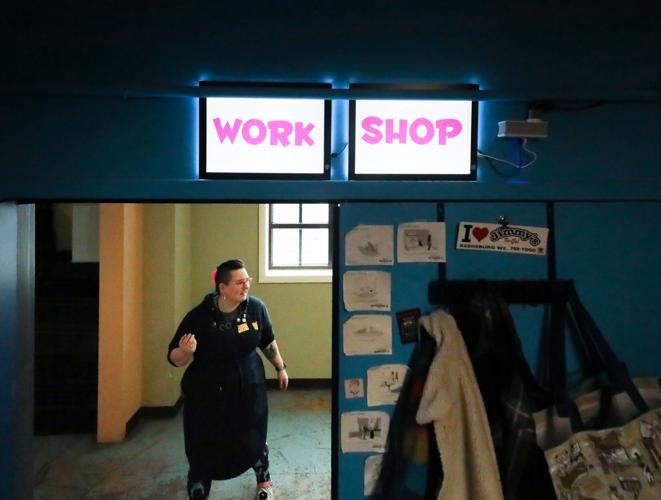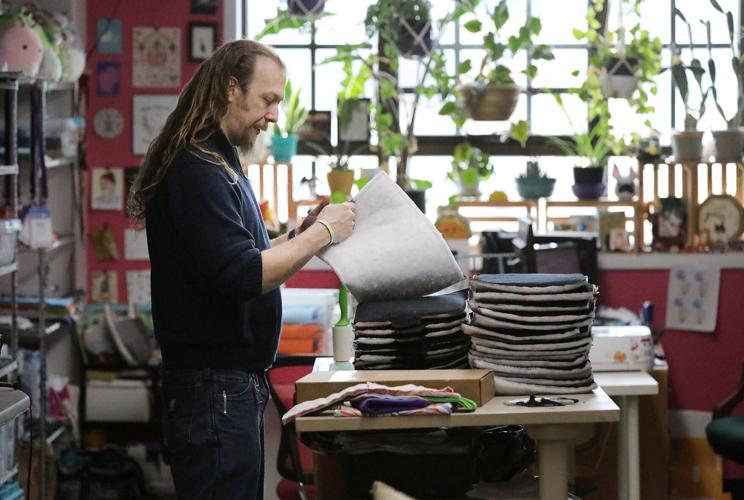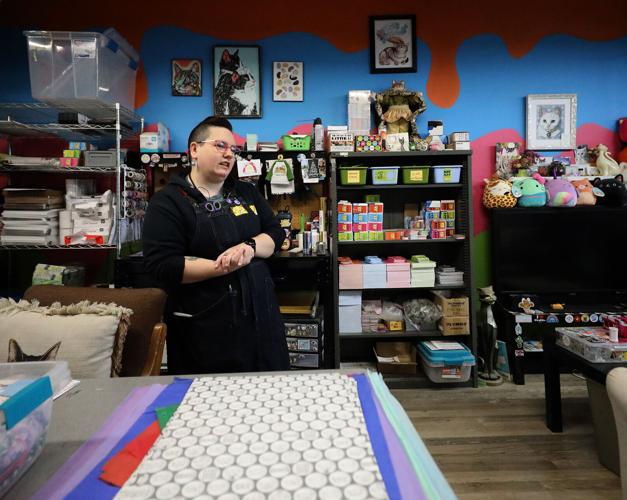
Meagan Porter, owner of TacoCat Creations, stores supplies in her 700-square-food studio shop on the East Side of Madison. She said she'd like to open a storefront, but can't afford Madison's retail rent prices.
Meagan Porter wants to take her retail cat toy business to the next level by leasing a storefront in Madison.
She can’t afford it.
Porter, who has owned and operated TacoCat Creations with her partner David Van for the last decade, has made her various products filled with catnip out of a 700-square-foot studio space at the Madison Enterprise Center on the East Side since October 2021.
She pays $614 a month in rent, based on square footage, for the studio, which Porter deems affordable. TacoCat Creations can churn a monthly net profit of up to $5,000 or almost nothing, depending on the time of year, Van said.
Yet, as TacoCat Creations cat toys grow in popularity, and as more of the studio lends itself to product storage, so does Porter’s desire to open a storefront with capacity for retail and to carry things that friends make. The current studio is also not very accessible to customers, Porter said, and she can only lease the space for a maximum of five years.
People are also reading…
Her dream storefront would be in or near the East Side neighborhood where Porter has lived for 11 years, and be under 1,000 square feet. But rising commercial rents in the Madison area are holding TacoCat Creations from that goal.
Small businesses across the Madison region have expressed similar concerns about rising rent. Some local retailers and restaurants that already have a storefront say most, if not all, their profits get put back into leasing costs. Others weigh raising prices for customers against closing down altogether.

TacoCat Creations owner Meagan Porter runs her business out of a 700-square-food studio and makes most of her sales online.
What has added to the high rents problem is long lease commitments, which can last around five years, said Saran Ouk, manager for the city of Madison’s Office of Business Resources. And often, leases aren’t flexible enough to allow small businesses to close if they fail.
“Most small businesses fail within the first five years,” Ouk said.
In 2022, the average rent for commercial properties in the region was $18.34 per square foot, according to data provided to the Wisconsin State Journal by Madison Commercial Real Estate, located on the West Side. In 2019, rents were around $15. In 2017, they were roughly $13, according to the data.
Structuring the price per square foot makes it easier for small businesses to navigate as they calculate how much retail space is needed, explained Ben Filkouski, Madison Commercial Real Estate broker.
In Madison’s most popular shopping districts, like Downtown, rents are around $20-$40 per square foot, said Mike Herl, managing broker for Madison Commercial Real Estate.
TacoCat Creations can afford $14 per square foot, Porter said.
Porter and Van have entertained opening a brick-and-mortar space outside of Madison. But the commute wouldn’t be worth it.
“I would love for our Taco fans — that’s what we call our customers — just to be able to come to our space and what we are creating and, maybe, buy some things,” Porter said. She said the studio got the business out of her house but it feels like a “half-step.”
“I’ve been looking for a space since 2018. Things haven’t changed that much since then,” she said. Developers “keep knocking down old buildings and putting up new construction, and the new construction is really expensive. The rent is really expensive. That drives up rent in other places in the neighborhood.”
‘Piggybacking’
Drastic cost increases for construction materials over the last few years pose one of the biggest hurdles to keeping commercial rents lower, Filkouski said.
The cost increases are primarily driven by COVID-era supply chain disruptions, as well as inflation.

David Van works in the office of TacoCat Creations, a producer of pet crafts owned by his partner, Meagan Porter, in Madison.
When a commercial development is constructed in any given Madison neighborhood, surrounding landlords automatically raise their rents to keep pace with the market, he said, calling that “piggybacking.” Landlords also want to attract tenants that are reflective of surrounding demographics, like income.
Hilldale Shopping Center, for instance, tends to attract higher-end retailers, as many surrounding residents tend to make six-figure salaries and have the money to spend on their product, Herl said.
Landlords and banks also tend to want to work with retail tenants “who are experienced,” Filkouski said, which is where organizations like Madison Commercial Real Estate can help.
“We can help provide credibility,” he said. “We deal with landlords every day. We are paid by the landlords. It usually doesn’t cost a tenant anything to use tenant representation services.”
Some local landlords and developers also say that high city fees also contribute to what they charge commercial tenants.
David Keller, of Madison urban developer Keller Real Estate Group, pointed to current property tax rates, and even high water bills, in particular.
Some progress
In the last few years, local landlords have started to ease up on long lease commitments, said Ouk.
She now more commonly sees lease agreements of one, two or even three years.
Still, brick-and-mortar shops are still pretty expensive for smaller businesses, she said.
The city has programs to get small retailers off the ground. One offers forgivable loans to small-business owners looking to purchase their first commercial property that cover 25% of the purchase price. After 15 years of successful ownership, the loan becomes a grant.
In October 2021, the city piloted an experimental pop-up shop initiative called Culture Collectives in order to promote small and diverse businesses while filling vacant storefronts on State Street. When the initiative launched, 11 microbusinesses rented a section of two State Street storefronts for a nominal fee.
The city worked with JD McCormick Properties, as well as the Madison Black Chamber of Commerce, Latino Chamber of Commerce and Hmong Wisconsin Chamber of Commerce, to get the initiative started.

TacoCat Creations owner Meagan Porter assembles a product in the workspace of her handmade pet crafts business in Madison.
Now, the city wants to evaluate whether to spend the money to keep Culture Collectives going, or put its resources elsewhere, Ouk said. The vision is to have a UW-Madison student survey Culture Collectives vendors, as well as the landlord, to gauge how the program has served them.
One criticism Ouk has heard from Culture Collectives vendors already is a lack of mentoring and coaching resources, she said.
And when asked about high fees charged to landlords, Ouk said “if there’s something we could do to help lower the burden, the city is open to hearing from the property owner.”
‘My passion’
Jodie Jefferson, owner of fast-food restaurant House of Flavas, 4905 Commercial Ave., said that all her profits get put back into her business, which has leased its space since August 2021.
Rent and utility bills eat up most of House of Flavas’ income, she said, adding that her monthly rate of $2,000 is not based on square footage.
The restaurant has four employees, including Jefferson.
“I started off with paying $1,500 in rent,” Jefferson said, adding that House of Flavas also has an outstanding light bill that’s worth $11,000.
When asked about the future of House of Flavas, Jefferson said, “I’m concerned about if I am able to catch up.”
“This is my passion,” Jefferson said of her desire to keep House of Flavas open. “This is my dream.”
Jefferson is optimistic that as the weather warms up, foot traffic will increase.
Careful planning
It took careful planning for Jeannette Burda and her daughter, Alisson, to find the optimal brick-and-mortar space for their art shop, Artsy Fartsy, Jeannette said. Opening an art shop had been their dream for 15 years.
Artsy Fartsy, which opened in August 2021, sells gifts and offers art classes at 1717 Monroe St.
The business had to be located on Monroe Street, Burda said. The duo would not accept anything less. After looking at several buildings, all of which had rents that were too expensive for Artsy Fartsy, mother and daughter settled on the former home of a women’s clothing store.
Burda said the space stood vacant for months, as previous prospective tenants likely couldn’t afford renovations the building needed. She was not comfortable sharing what the shop currently pays in rent.
She said she didn’t consider moving out of Madison.
“The location is too important,” she said.
Photos: The wood coffins in Thailand caves
Thailand's wood coffins in caves

Craig Deller worked in his bare feet and crawled on his belly to reach some of the wooden coffins found in caves and cliff shelters in the Pang Mapha District of the Mae Hong Son Province of Thailand. Deller has been working on historic wooden objects for more than 40 years.
Thailand's wood coffins in caves

A Thai researcher works last month on a 2,000-year-old wooden coffin that was among those found in 2016 in northwestern Thailand.
Thailand's wood coffins in caves

The wooden coffins found in Thai caves are made from teak logs that have been halved. One half holds remains, while the other half serves as a lid. In some cases, coffins were found stacked three high.
Thailand's wood coffins in caves

Wooden coffins found in caves and cliff shelters in the Pang Mapha District of the Mae Hong Son Province of Thailand are explored and analyzed by researchers.
Thailand's wood coffins in caves

Craig Deller of Madison is seen here last month during his exploration of a cave in Thailand. He was recruited to help come up with a plan on how to preserve the coffins.
Thailand's wood coffins in caves

Researchers used headlamps and portable lights to work on wooden coffins found in caves in Thailand.
Thailand's wood coffins in caves

Many of the wood coffins were found intact in Thai caves, but others were in pieces.
Thailand's wood coffins in caves

Wooden 2,000-year-old coffins found in caves and cliff shelters in 2016 in northwestern Thailand are explored and analyzed by researchers in February. The job now is to determine how to best preserve the coffins.
Thailand's wood coffins in caves

During a break from working in caves in Thailand, Craig Deller speaks with Thai conservators and researchers. Deller spent two weeks in Thailand, including time inside caves in the northwestern part of the country near the Myanmar border.
Thailand's wood coffins in caves

This photo shows the scale of some of the caves in Thailand in which wooden coffins were found in 2016.
Thailand's wood coffins in caves

Craig Deller, of Madison, holds shards of wood from ancient coffins recovered from Thai caves. Deller is helping Thai researchers come up with a plan to preserve the coffins, which could further deteriorate due to climate in the caves as well as bugs and microorganisms.







